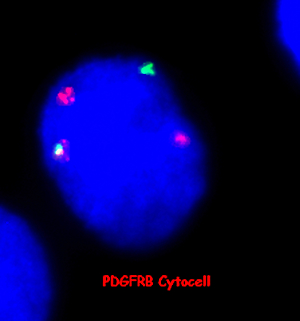Online first
Current issue
Archive
Special Issues
About the Journal
Publication Ethics
Anti-Plagiarism system
Instructions for Authors
Instructions for Reviewers
Editorial Board
Editorial Office
Contact
Reviewers
All Reviewers
2024
2023
2022
2021
2020
2019
2018
2017
2016
General Data Protection Regulation (RODO)
CASE REPORT
Use of microarrays and MLPA for integrating diagnostics and personalizing treatment – Case report of a patient with Ph-like acute B-cell lymphoblastic leukemia
1
Laboratory of Genetic Diagnostics, Department of Paediatric Haematology, Oncology and Transplantology, Medical
University, Lublin, Poland
2
Laboratory of Genetic Diagnostics, Medical Univesity, Lublin, Poland
3
Department of Paediatric Haematology, Oncology and Transplantology, Medical University, Lublin, Poland
Corresponding author
Monika Lejman
Medical University of Lublin Laboratory of Genetic Diagnostics, Department of Pediatric Hematology, Oncology, and Transplantology, A. Gębali, 20-093, Lublin, Poland
Medical University of Lublin Laboratory of Genetic Diagnostics, Department of Pediatric Hematology, Oncology, and Transplantology, A. Gębali, 20-093, Lublin, Poland
Ann Agric Environ Med. 2020;27(4):713-716
KEYWORDS
TOPICS
ABSTRACT
B-cell precursor acute lymphoblastic leukemia (BCP-ALL) is the most common childhood cancer. A special subtype of high risk BCP-ALL is Philadelphia-like ALL (Ph-like ALL), in which the gene expression profile is similar to BCR-ABL1-positive leukemia; however, fusion of the mentioned genes does not occur. The unfavourable clinical course and incidence of 15% of cases means that the diagnosis and therapeutic strategy of Ph-like ALL must be carefully developed and implemented
into clinical practice. The study presents the case of a patient with diagnosed Ph-like ALL. The use of molecular analytical techniques has made it possible to identify a patient who is likely to relapse and who may benefit from personalized therapy This study shows the advantages of using genomic analyses to identify therapeutic targets, which is especially important for patients with high-risk disease. This model of management could be extended to other cancer subtypes, allowing for tailored diagnosis.
Lejman M, Włodarczyk M, Zaucha-Prażmo A, Zawitkowska J. Use of microarrays and MLPA for integrating diagnostics and personalizing
treatment – Case report of a patient with Ph-like acute B-cell lymphoblastic leukemia. Ann Agric Environ Med. 2020; 26(4): 713–716.
doi: 10.26444/aaem/115393
REFERENCES (17)
1.
Mohseni M, Uludag H, Brandwein JM. Advances in biology of acute lymphoblastic leukemia (ALL) and therapeutic implications. Am J Blood Res. 2018; 8(4):29–56.
2.
Ma X, Edmonson M, Yergeau D, Muzny DM, Hampton OA, Rusch M, et al. Rise and fall of subclones from diagnosis to relapse in pediatric B-acute lymphoblastic leukaemia. Nat Commun. 2015; 6: 6604. https://doi.org/10.1038/ncomms....
3.
Chiaretti S, Zini G, Bassan R. Diagnosis and subclassification of acute lymphoblastic leukemia. Mediterr J Hematol Infect Dis. 2014; 6(1): e2014073. https://doi.org/10.4084/MJHID.....
4.
Bhatla T, Jones CL, Meyer JA, Vitanza NA, Raetz EA, Carroll WL. The biology of relapsed acute lymphoblastic leukemia: opportunities for therapeutic interventions. J Pediatr Hematol Oncol. 2014; 36(6): 413–418. https://doi.org/10.1097/MPH.00....
5.
Iacobucci I, Mullighan CG. Genetic Basis of Acute Lymphoblastic Leukemia. J Clin Oncol. 2017; 35(9): 975–983. https://doi.org/10.1200/JCO.20....
6.
Malouf C, Ottersbach K. Molecular processes involved in B cell acute lymphoblastic leukaemia. Cell Mol Life Sci. 2018; 75(3): 417–446. https://doi.org/10.1007/s00018....
7.
Khan M, Siddigi R, Tran TH. Philadelphia chromosome-like acute lymphoblastic leukemia: A review of the genetic basis, clinical features, and therapeutic options. Semin Hematol. 2018; 55(4): 235–241. https://doi.org/10.1053/j.semi....
8.
Roberts KG, Li Y, Payne-Turner D, Harvey RC, Yang YL, Pei D, et al. Targetable kinase-activating lesions in Ph-like acute lymphoblastic leukemia. N Engl J Med. 2014; 371(11): 1005–1015. https://doi.org/10.1056/NEJMoa....
9.
Roberts KG. Why and how to treat Ph-like ALL? BEST PRACT RES CL HA. 2018; 31: 351–356. https://doi.org/10.1016/j.beha....
10.
Madzio J, Pastorczak A, Młynarski W. Molecular background and therapeutic perspectives of acute lymphoblastic leukemia BCR-ABL1-like. Hematologia 2014; 5(2): 154–161.
11.
Roberts KG, Gu Z, Payne-Turner D, McCastlian K, Harvey RC, Chen IM, et al. High frequency and poor outcome of Philadelphia chromosome-like acute lymphoblastic leukemia in adults. J Clin Oncol. 2017; 35: 394–401. https://doi.org/10.1200/JCO.20....
12.
Schwab C, Ryan SL, Chilton L, Elliott A, Murray J, Richardson S, et al. EBF1-PDGFRB fusion in pediatric B-cell precursor acute lymphoblastic leukemia (BCP-ALL): genetic profile and clinical implications. Blood 2016; 127(18): 2214–2218. https://doi.org/10.1182/blood-....
13.
Boer JM, Steeghs EM, Marchante JR, Boeree A, Beaudoin JJ, BeverlooHB, et al. Tyrosine kinase fusion genes in pediatric BCR-ABL1-like acute lymphoblastic leukemia. Oncotarget. 2017; 8(3): 4618–4628. doi:10.18632/oncotarget.13492.
14.
Cannarile MA, Weisser M, Jacob W, Jegg AM, Ries CH, Rüttinger D. Colony-stimulating factor 1 receptor (CSF1R) inhibitors in cancer therapy. J Immunother Cancer. 2017; 5(1): 53.
15.
Boer JM, den Boer ML. BCR-ABL1-like acute lymphoblastic leukaemia: From bench to bedside. Eur J Cancer. 2017; 82: 203–218. https://doi.org/10.1016/j.ejca....
16.
Roberts KG. Genetics and prognosis of ALL in children vs adults. Hematology Am Soc Hematol Educ Program. 2018; 2018(1): 137–145. https://doi.org/10.1182/ashedu....
17.
Chang J, Douer D, Aldoss I, Vahdani G, Jeong AR, Ghaznavi Z, et al. Combination chemotherapy plus dasatinib leads to comparable overall survival and relapse-free survival rates as allogeneic hematopoietic stem cell transplantation in Philadelphia positive acute lymphoblastic leukemia. Cancer Med. 2019; 8(6): 2832–2839. https://doi.org/doi:10.1002/ca....
Share
RELATED ARTICLE
We process personal data collected when visiting the website. The function of obtaining information about users and their behavior is carried out by voluntarily entered information in forms and saving cookies in end devices. Data, including cookies, are used to provide services, improve the user experience and to analyze the traffic in accordance with the Privacy policy. Data are also collected and processed by Google Analytics tool (more).
You can change cookies settings in your browser. Restricted use of cookies in the browser configuration may affect some functionalities of the website.
You can change cookies settings in your browser. Restricted use of cookies in the browser configuration may affect some functionalities of the website.



